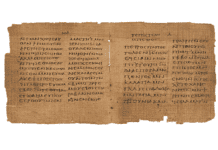Speaking near midnight Sunday, Sen. Elizabeth Warren, D-Mass., called the vote “illegitimate” and “the last gasp of a desperate party.”
Several matters are awaiting decision just a week before Election Day, and Barrett could be a decisive vote in Republican appeals of orders extending the deadlines for absentee ballots in North Carolina and Pennsylvania.
The justices also are weighing Trump’s emergency plea for the court to prevent the Manhattan District Attorney from acquiring his tax returns. And on Nov. 10, the court is expected to hear the Trump-backed challenge to the Obama-era Affordable Care Act. Just before the Senate voted, the court sided with Republicans in refusing to extend the deadline for absentee ballots in Wisconsin.
Trump has said he wanted to swiftly install a ninth justice to resolve election disputes and is hopeful the justices will end the health law known as “Obamacare.”
In a statement, Democratic presidential candidate Joe Biden tied Barrett’s nomination to the court to the Republican effort to pull down the Affordable Care Act. He called her confirmation “rushed and unprecedented” and a stark reminder to Americans that “your vote matters.”
During several days of public testimony before the Senate Judiciary Committee, Barrett was careful not to disclose how she would rule on any such cases.
She presented herself as a neutral arbiter and suggested, “It’s not the law of Amy.” But her writings against abortion and a ruling on “Obamacare” show a deeply conservative thinker.
Sen. Lindsey Graham, R-S.C., the chairman of the Judiciary Committee, praised the mother of seven as a role model for conservative women. “This is historic,” Graham said.
Republicans focused on her Catholic faith, criticizing earlier Democratic questions about her beliefs. Graham called Barrett “unabashedly pro-life.”
At the start of Trump’s presidency, McConnell engineered a Senate rules change to allow confirmation by a majority of the 100 senators, rather than the 60-vote threshold traditionally needed to advance high court nominees over objections. That was an escalation of a rules change Democrats put in place to advance other court and administrative nominees under President Barack Obama.
Republicans are taking a political plunge days from the Nov. 3 election with the presidency and their Senate majority at stake.
Only one Republican — Sen. Susan Collins, who is in a tight reelection fight in Maine — voted against the nominee, not over any direct assessment of Barrett. Rather, Collins said, “I do not think it is fair nor consistent to have a Senate confirmation vote prior to the election.”
Trump and his Republican allies had hoped for a campaign boost, in much the way Trump generated excitement among conservatives and evangelical Christians in 2016 over a court vacancy. That year, McConnell refused to allow the Senate to consider then-President Barack Obama’s choice to replace the late Justice Antonin Scalia, arguing the new president should decide.
Most other Republicans facing tough races embraced the nominee who clerked for the late Scalia to bolster their standing with conservatives. Sen. Thom Tillis, R-N.C., said in a speech Monday that Barrett will “go down in history as one of the great justices.”
But it’s not clear the extraordinary effort to install the new justice over such opposition in a heated election year will pay political rewards to the GOP.
Demonstrations for and against the nominee have been more muted at the Capitol under coronavirus restrictions.
Democrats were unified against Barrett. While two Democratic senators voted to confirm Barrett in 2017 after Trump nominated the Notre Dame Law School professor to the appellate court, none voted to confirm her to the high court.
In a display of party priorities, California Sen. Kamala Harris, the Democratic vice presidential nominee, returned to Washington from the campaign trail to join colleagues with a no vote.
No other Supreme Court justice has been confirmed on a recorded vote with no support from the minority party in at least 150 years, according to information provided by the Senate Historical Office.
By Lisa Mascaro. Associated Press writers Mary Clare Jalonick, Andrew Taylor, Mark Sherman, Zeke Miller and Aamer Madhani in Washington and Kathleen Ronayne in Sacramento, Calif., contributed to this report.
This article originally appeared on APNews.com.











